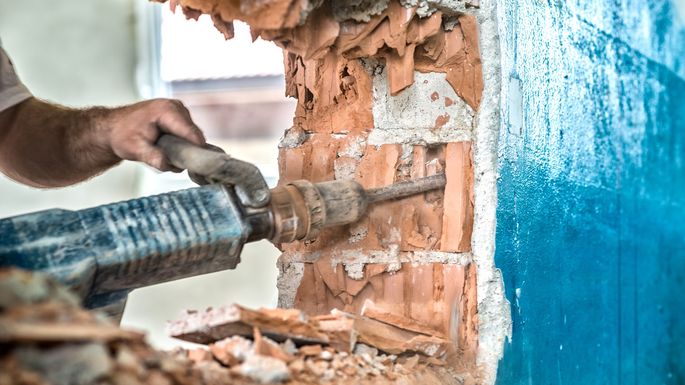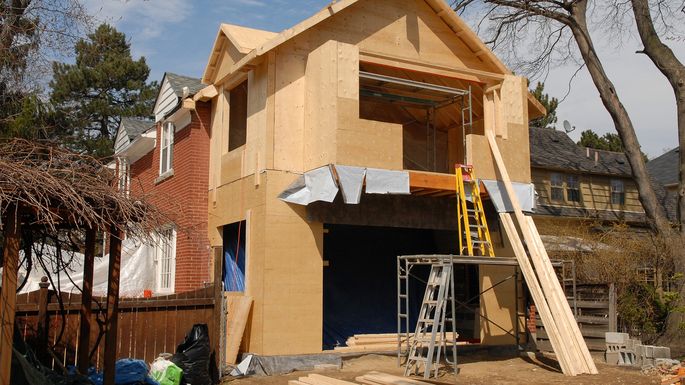7 Home Improvements That Could Turn Your Neighbors Against You

The good news: You’re upgrading your home! The potential downside? You might be downgrading your neighbors’ quality of life in the process. Sadly, not every home or yard improvement you embark upon is a boon for all the people who live around you.
Think of it this way: It’s a personal choice to buy into the mom jeans trend or rock a man bun. But what about everyone else who has to see you?
There are a few home improvement projects that, while certainly well-intentioned, are likely to make your neighbors cringe. We’re not saying you should skip them altogether, but if you take on one of these upgrades, make sure to do it in a way that won’t make you that guy. You’re on your own with the whole man bun thing, though.
1. Additions that take away a view—or offer too much
What’s one of the most unpopular home improvements that Mark Grisafe, an architect in Long Beach, CA, sees? “Large additions that block views or cast shadows onto a neighboring lot.”
Nobody likes their stellar view of a city skyline, mountains, or the sun suddenly gone.
The opposite is true, too. Say that when you put in your gorgeous new addition, you didn’t take into account where your windows line up with your neighbors’ house. No big deal, right? Well, that depends on whether or not your neighbors like to get comfortable inside their homes.
“If your windows aren’t properly aligned, it will make it possible to wave to your neighbor while you’re taking a bath or in the toilet compartment,” Grisafe says. This could make your annual block party a little awkward.
2. Long, industrious renovation projects

If you’re going to start a home renovation project, please—for the love of all that is holy—finish it in a timely manner.
“There are few construction sins as unforgivable as a house that gets through the framing stage and then sits for years while the plywood sheathing turns from a freshly cut tan color to dingy gray,” Grisafe says.
Also not appreciated by neighbors, he says: “a permanent front yard landscape palette that features weeds and chain-link construction fence and lingers for years.”
The same goes for any project that causes endless noise or inconvenience to your neighbors. No one’s faulting you for wanting to make earnest improvements to your home. But you’ll want to be prepared for some dirty looks from your neighbors, especially if you decide to take on large projects that bring noise to the street early every morning along with the congestion and mess of construction. (Mark Zuckerberg is allegedly guilty of this one.)
When you get ready to upgrade your home, work with your contractor to limit construction noise and congestion as much as you can.
3. Gaudy colors
“Bright primary colors are just not proper for exterior use, unless you live in Key West or the Caribbean,” advises Juan Carlos Daetz, home design expert at Max Warehouse. “Really, any color that goes against the theme or general use of the neighborhood can be distracting and may harm property values.”
Make sure to check your HOA guidelines and neighborhood covenantsbefore embarking on a paint job—they could restrict your choices. And even if you aren’t channeling your inner Keith Haring, consider carefully whether that shade of Millennial Pink is really the right fit for the neighborhood. If you can’t live without it, bring the color inside.
4. Outdoor living spaces
Over the past few years, patios and yards have become a full-blown extension of the living space. Think outdoor fire pits, expansive TVs, sound systems, hot tubs, kitchens—as homeowners, we’ve truly embraced the idea of seamless flow between our indoor and outdoor lives.
And there’s nothing wrong with that. But any time you make such outdoor improvements, it might make your neighbors a little skittish over how you’re going to use that new, luxe space.
“Remember your neighbors when you throw those late-night bashes,” Daetz advises. “Either invite them, too, or keep control over your friends who seem to get louder and louder as the evening goes on.”
5. Manicured lawns

“Nothing drives neighbors nuts faster than a lawn maintenance team that mows early in the morning,” says Brad Woods, owner of American Turf and Tree Care, in Colorado.
Equally, if not more, offensive: If all your leaves are blown into your neighbor’s yard. Feel free to ask your lawn maintenance crew to be mindful of keeping things within your property boundaries. And if you’re worried you’re waking up your neighbors—for instance, you see them in their pajamas, glaring at you from across the street—ask for a different schedule.
“Most lawn care and lawn maintenance companies will be receptive to homeowners who express a concern about the timing of their service,” Woods says.
6. Turbocharged irrigation systems
Woods once had a customer whose neighbor installed a brand-new irrigation system—and then proceeded to flood all the yards and gardens around him by watering for too long every day. Good intentions, bad execution.
“Your lawn will be its healthiest with less frequent, deep waterings, so you don’t need to turn the water on every single day,” Woods advises. “If your sprinkler system’s leaking over your property line, you could be drowning your neighbor’s grass and increasing your water bill.”
Plus, if you’re watering so much that there’s standing water on or near your property, you’ll quickly become ground zero for mosquitoes and other insects. So dry up those puddles and dial it back on the irrigation—before you bug your neighbors (and yourself).
7. Extra lighting
A lot of lighting in your backyard can improve home security, add to the atmosphere, and ensure parties don’t have to end once it gets dark. That said, some homeowners manufacture a glow that keeps their neighbors up at night, Woods warns.
To avoid being one of those homeowners, “make sure lights aren’t aimed through your neighbors’ windows, and be considerate about the hours that you use high-beam lights,” he says.
The bottom line: You can avoid most kerfuffles with your neighborhood or HOA by simply being a kind and courteous neighbor.
“Sometimes,” Daetz says, “just a simple heads-up that you’ll be planning a party or erecting a fence can do wonders to avoid hard feelings or, worse, feuds.”
